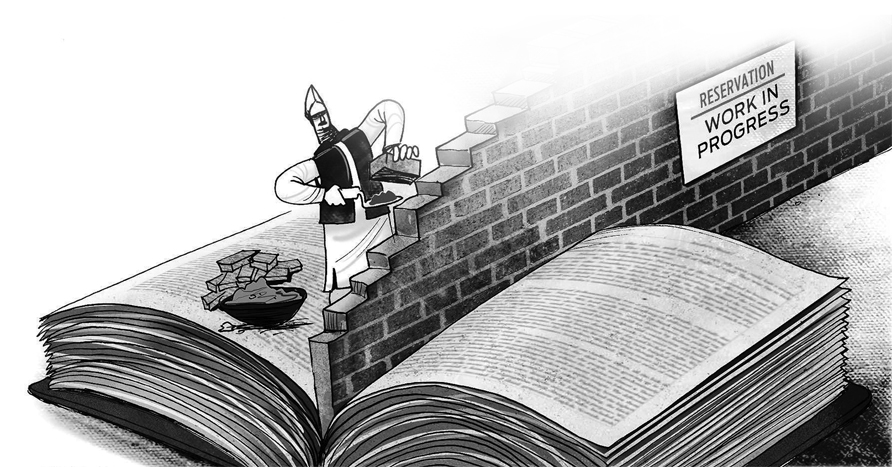V.Kumaresan
Social Justice has been dispensed with to the toiling masses discriminated by birth who were socially deprived for many centuries. This compensatory justice was extended to the persecuted people against the injustice inflicted on them in the name of god and religion. Social Justice emerged out of the injustice prevailed in the society. To dispense the social justice to who were denied education and ordained to do the profession, perpetuated as ‘Kuladharma’ the reservation policy was introduced. To eliminate the monopoly of brahminical upper caste both in education and employment, reservation was introduced by the British rulers prior to the attainment of political independence. Corollary to the national movement for political independence, social movement was struggling for equitable justice in the form of communal reservation in the Princely States of Travancore (Kerala), Mysore (Karnataka) and Kholhapur (Maharashtra) and in the Madras Presidency under the ‘Rule of Diarchy’ in 1920s.
The discriminated masses were divided unequally under the hierarchy of caste system sanctified by varnashra dharma. The basis of providing social justice through reservation was oriented on caste identities. It is not mere caste identity but is coupled with social deprivation and denial of basic human rights. The social deprivation was practiced in the form of untouchability, unseeability and unapproachability at various layers of the society in different forms. The identity of caste and its effect are not uniform for all. For the people in the lower rung of the society, the identity reveals the deprivation, whereas for in the upper, it is a symbol of privilege, monopoly over and subjugating the lower rungs. Compensation could be provided only for the deprived and denied sections in the society owing to their caste identities. Compensation is meaningless to the people with upper caste identities, as reservation becomes irrelevant to them. The people who are in the upper rung have grabbed the educational opportunities of others and got overrepresented in comparison to numerical strength, the application of reservation mode is not appropriate but unethical too. They are not socially deprived and educationally they were not denied. The relevance of reservation policy to the marginalized masses owing to the caste identities is apt, appropriate and equitable. The social revolutionary Periyar emphasized communal reservation in the form of proportionate reservation from late 1910s. The principle of social justice prevailed from the beginning of 20th century but the policy formulations kept changing as per the change of the political masters who governed to nation.
The socially deprived and educationally denied masses were identified as backward classes and among them the more deprived and denied were identified as the Scheduled Castes and the Scheduled Tribes. Again all these deprived classes were sub categorized further to make effective the reservation applicable to them. Besides the reservation measures introduced in education and job, it was sustained in legislative bodies even after the Indian Constitution was adopted in November 1949 and came to force from 26th January 1950.
Dispensation for Deprivation:
The Indian Constitution ensures in the ‘Preamble’ itself, the dispensation of justice, social, economic and political. To dispense the social justice, social deprivation is the criterion for entitlement. The social deprivation is fixed on caste identity and it is oriented by birth, the caste identity of the family where the particular individual is born. The prime objective of reservation policy is to eliminate the deprivation so that disparities between the social status levels of the deprived get equalized. So reservation is meant primarily to bring equality of the socially deprived on par with the others. On its attainment the caste based discrimination will vanish off.
In respect of the dispensation of economic justice, caste identities are irrelevant. Those who are economically deprived, again such economic deprivation need not be based on birth and cannot be a permanent deprivation as that of caste identity. To provide economic justice, depending upon the levels of backwardness on economic front, economically weaker section, below poverty line, the economic benefit of cash compensation could be the mode. Such cash compensation may be in the form of financial assistance to the desired economically deprived. The beneficiaries under economic deprivation cannot be permanent; since economic deprivation itself is not permanent. The people who are economically deprived may become advanced and well off later and vice versa could also be possible. Depending upon the level of economic condition of the families, economic justice has to be dispensed with. The bone of contention of the discussion is that social deprivation has to be tackled through reservation policy and economic deprivation has to be through financial welfare measures and vice versa will defeat the very purpose of dispensation of justice – social and economic as enunciated in the Constitution.
Social Justice Dispensation has to go a long way:
The dispensation of social justice through the reservation policy has to be construed as just commenced, when the span of nearly two millennium social deprivation is reckoned. Even though the reservation has commenced, it has not reached all the areas of education and employment. Certain areas of governance explicitly higher judiciary services has not seen the light of reservation to any of the deprived sections. Besides, the officially provided reservation in percentage terms is not adequate to the level of population of the respective socially deprived sections. Apart from that the officially prescribed quantum of reservation (%) despite its inadequacy the socially deprived sections, are not duly represented even to the level of prescribed percentage. This sort of reservation policy in practice exists for the past seven decades in the country. This sort of compensatory justice, being dispensed is akin to the proverbial saying, ‘With the aid of thorn tips, THREE wells were dug, of which ONE well is barren and in the other TWO there is no water at all’.
The reservation policy in practice is inadequate, ineffective and the resultant effect is very minimal.
Even for this level of reservation there is a huge cry among the upper caste lobby that their opportunities are grabbed by the socially deprived sections the merit and efficiency are compromised by implementing reservation policy; the total reservation for all the socially deprived classes put together cannot exceed 50 percent which is also strengthened through the verdict of the Supreme Court of India.
Unwilling to sustain the reservation policy, the RSS – BJP combine in order to approve the aspirations of the upper caste under the brahminical hegemony, has introduced the economic criterion in the reservation policy by bringing the Constitution (103rd Amendment) Act 2019 which is unconstitutional, unethical and impracticable. To introduce this irrelevant fundamental to reservation policy no study, a survey was conducted by the BJP led NDA rulers. When the desired socially deprived lot fought for many decades even to achieve the adequate level of reservation for them, through not implementation the RSS-BJP combine has introduced 10 reservation for the economically weaker sections (EWS) in education and employment within a span of 1 week (7th January 2019 Union Cabinet approves the policy decision. With the passing of the Bill in both the Houses of Parliament devoid of due detailed discussion the passed Bill got the assent of President of India and came into force on 14th January 2019).
Can constitutionally valid reservation measures be brought deprived in hurried manner that too economically? In order to appease the upper castes for cornering their votes, the opposition parties have all also voted in favor of the Bill despite their threadbare comments on the Bill.
The brahminical upper caste unable to sustain their glorious monopoly in education and employment are more vigilant and accomplish the task, whereas the socially deprived whose reasonable entitlement and empowerment gets affected are in deep slumber! The amended Act has been challenged in Madras High Court and the Supreme Court of India on the ground that the introduction of economic criterion in the reservation policy is against the Basic Structure of the Constitution, which cannot be changed at all.
The upper caste for whose cause RSS – BJP combine has been striving for was critical against the reservation policy during the past. Can they advocate that 10% reservation for EWS?
Will it not affect the merit and efficiency in services as per the cacophony by them earlier? Will they come forward to speak in same language that the total reservation should not exceed 50 percent, when the 10% reservation for EWS has enabled the exceeding of 50 percent total reservation in education and employment? How far does the validity of the constitution (103rd Amendment) Act 2019 withstand the scrutiny of the judiciary? Mere scrutiny by the judiciary will not suffice. Revolting against the amendment Act must erupt throughout the country by mobilizing the aggrieved lot of the socially deprived. Let the mockery made by RSS-BJP combine in the reservation policy be exposed and the forces against the social justice be defeated!
Reformer-Poet Kabir says
Were the Creator
Concerned about caste,
We’d arrive in the world
With a caste mark on the forehead.
If you say you’re a Brahmin
Born of a mother who’s a Brahmin,
Was there a special canal
Through which you were born?
And if you say you’re a Turk
And your mother’s a Turk,
Why weren’t you circumcised
Before birth?
Nobody’s lower caste;
The lower castes are everywhere.
They’re the ones
Who don’t have Rama on their lips.
Translated by :
Arvind Krishna Mehrotra







